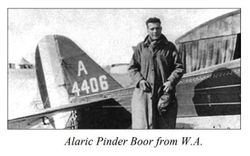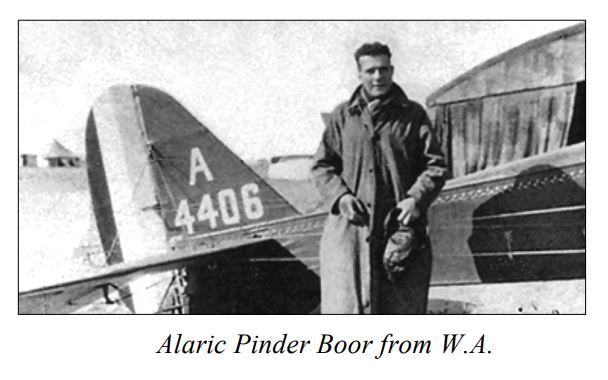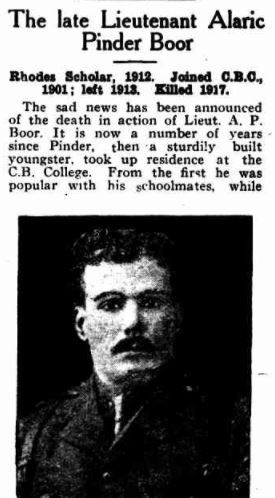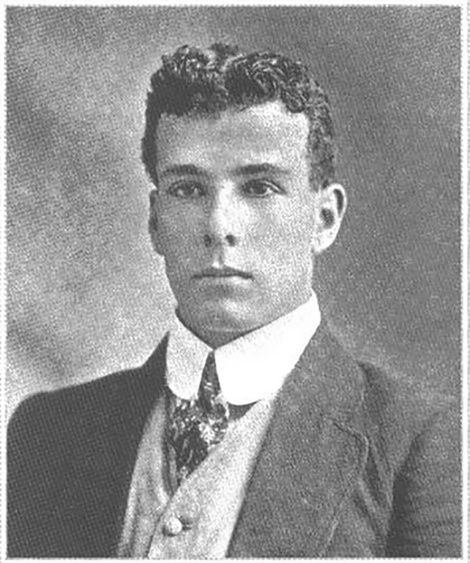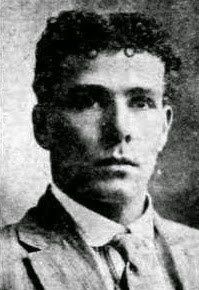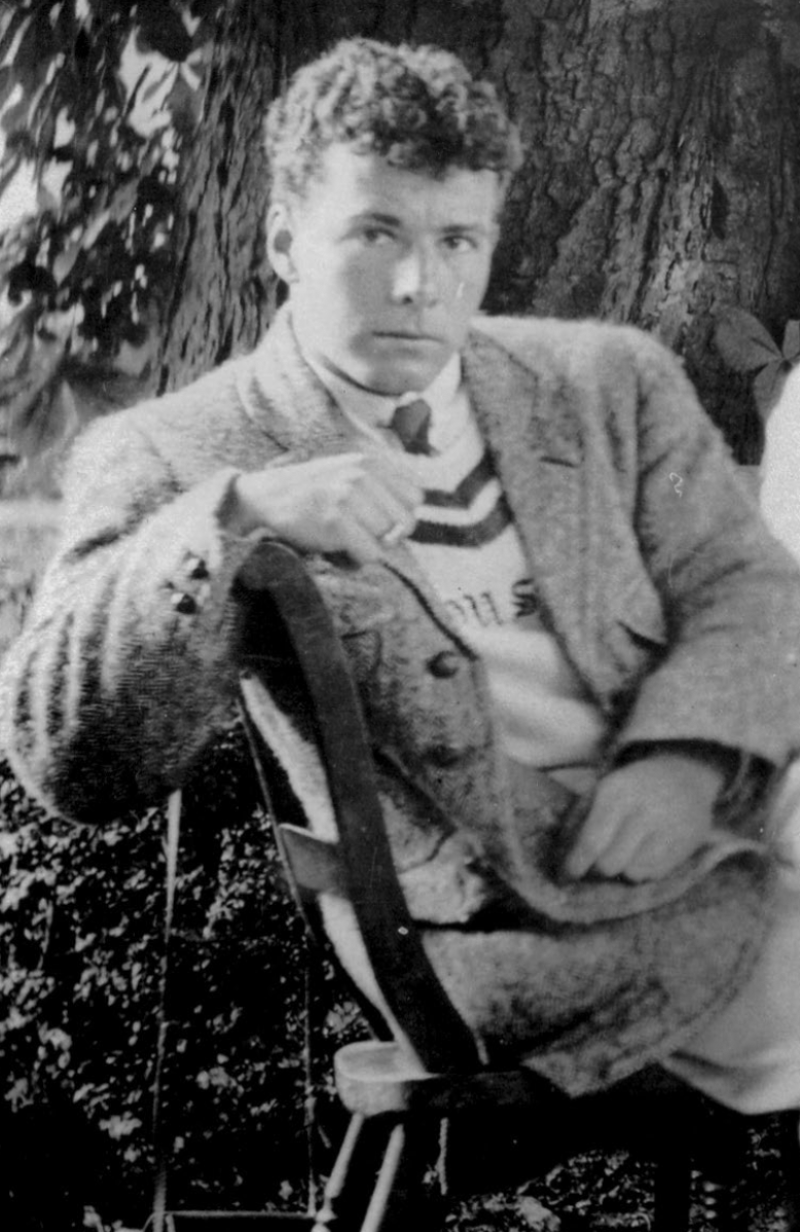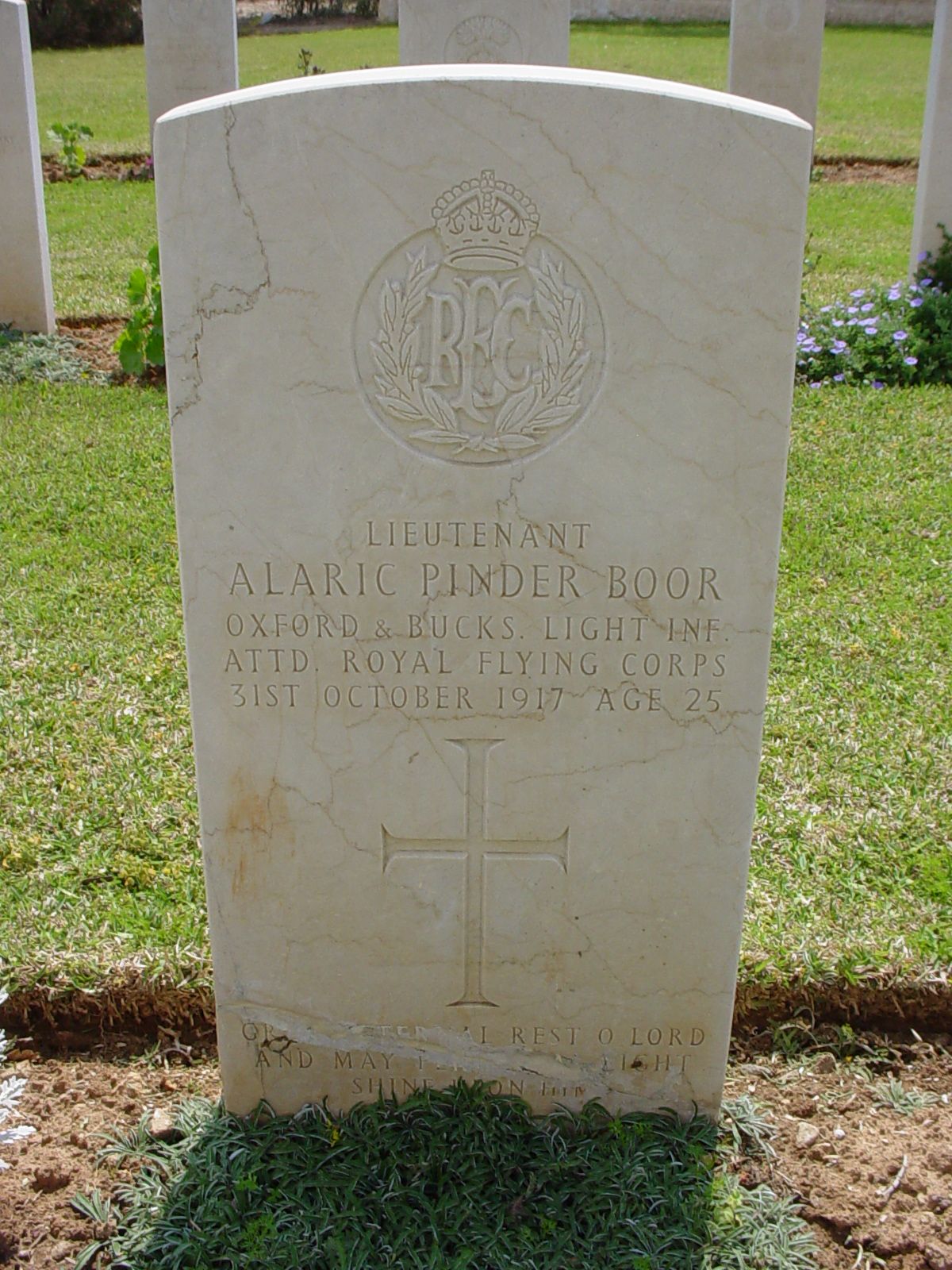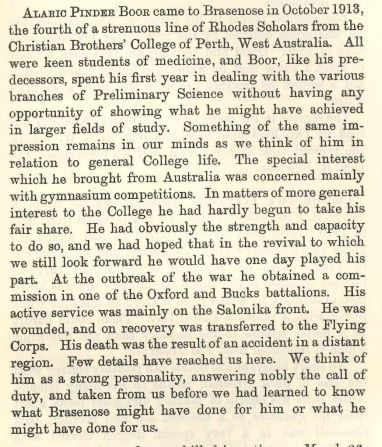Age: 25
Regiment/Service: Royal Flying Corps, 113th Sqdn
Lieutenant Alaric Pinder BOOR
From Australia serving in the Royal Flying Corps
Lt Boor was studying medicine at Oxford University when war broke out.
Service No: Not Assigned
Born: Perth WA, 18 October 1892
Unit: 113th Squadron*, Royal Flying Corps (based at Weli Sheikh Nuran)
Died: Injuries from Air Operations, Palestine, 31 October 1917, Aged 25 Years
Buried: Beersheba War Cemetery, Palestine
CWGC Additional Information: Son of John Arthur and Emily Mary Boor, of Bunbury, Western Australia
Remembered: Commemorative Roll, Australian War Memorial, Canberra ACT
Lieutenant Boor is the 1913 Western Australian Rhodes Scholar. A Boarding House at Aquinas College, Salter Point WA, is named in his memory.
Lieutenant Boor died during the Battle of Beersheba. At 0830 hours on 31 October, Lieutenant Boor (Pilot) took off along with Lieutenant John Herman Muller RFC (Observer) in an RE8 aircraft on a reconnaissance mission over the Beersheba area. Their task was to report on the defensive and offensive capacities of the Germans and Turks. The reports made by Muller were written down on note paper, wrapped around a stone and thrown down over the British Headquarters. The aircraft was reported to have "fallen out of control" and then crashed, killing Lieutenant Muller and fatally injuring Lieutenant Boor who died later in the day.
* Cutlack, F.M. (Frederic Morley) The Australian Flying Corps in the Western and Eastern Theatres of War 1914-8, Angus and Robertson Ltd Sydney, 1941 – Page 77 names the Unit as "X" Squadron RFC
___________________-
AQUINAS
Class of 1912
Alaric Pinder Boor, son of a draper from Carnarvon, was a giant amongst men in nearly everything he touched: sport, academia and socially as a person, he was a natural role model. In his journey through school, he impressed those he worked with and competitors equally. As Captain of both the Football and Cricket teams and as champion in Boxing and Gymnastics his opponents frequently commented on his sense of fairness and sportsmanship.
As Head Prefect and Dux of the College, he also made time to mentor young students. He even captained the Inter-School Tug-of-War team. Pinder won a Rhodes Scholarship to study at Oxford, with the intention of becoming a doctor. He was universally liked and admired.
Lieutenant Boor fought during WWI in the 7th Battalion Oxfordshire and Buckinghamshire Light Infantry and was attached to the No. 113 Squadron Royal Flying Corps. He played a crucial role in the memorable Battle of Beersheba on 31st October 1917. On his last day on earth, Lt Boor led a reconnaissance mission flying an RE8 aircraft over German and Turkish troops in Palestine to gauge the strength of the enemy. He took off at 0830 and, tragically, crashed on the return along with his co-pilot.
Engine failure was the probable cause. Ironically, he never knew that the charge his troops went on to fight later that day was one of the "last great cavalry charges in military history". His commanding officer summed him up when writing to his parents after his death: "With the very deepest sympathy for you who had so grand a man for a son. Believe me."
During his time at CBC on the Terrace, Pinder exploited the opportunity to learn and make a difference to the full. He claimed academic and sports' honours in equal measure. However, it was his sense of fairness and his ability to lead that made him stand out from the pack.
The Pinder Boor Boarding House at Aquinas College is named in his honour.
When he died in 1917 the Head Boy of Scotch College sent a letter to the school noting Pinder Boor was: "a scholar and athlete… an opponent regarded with affection and respect by all who came in contact with him… the best sportsman in the true meaning of the term."
Alaric Pinder Boor was an outstanding all-rounder who made an impact on whomever he encountered.
______________________-
RHODES SCHOLAR
Lieutenant Alaric Pinder Boor [1] Rhodes Scholar, 1912.
Joined C.B.C., 1901 - left 1913. Killed 1917.
The sad news has been announced of the death in action of Lieut. A. P. Boor.
. . . . . . It is now a number of years since Pinder, then a sturdily built youngster, took up residence at the C.B. College. From the first he was popular with his schoolmates, while his teacher found him a splendid type of scholar.
One of the earliest recollections of young Pinder goes back to the day that Sir Arthur Lawley, then Governor of the State, was paying a visit of inspection to the College, Pinder was asked by His Excellency to translate a piece of Latin prose, and so well did he acquit himself that Sir Walter James, Premier of the State at that time, and himself no mean Latin scholar, congratulated him on his effort, and predicted a brilliant scholastic career for the young scholar.
Sir Walter's prediction was a good one. From class to class he progressed, gaining new honours every year. It will not be necessary to. give here the full details of his brilliant University passes; suffice it to say that they have seldom been equalled in the annals of the college. A perusal of the college and honour boards reveals the fact that in 1912 he was. Dux of the College and the same year he won the Ormond Scholarship. (Melbourne).
His greatest scholastic triumph was yet to come. In 1913 he was chosen Rhodes Scholar, [2] a most popular selection. It was not only in the world of books that he made his mark. The Latin quotation, "Mens sana in corpore sano," aptly describes him. He was captain of the football eighteen in 1911 and 1912. He was captain of the cricket in 1912. champion boxer of the college in 1912, and champion gymnast in 1909, 1910, 1911. and 1912. Such a record speaks for itself. And to this an unblemished record of good conduct during the long stay at the college, and readers will understand how the news of his death was received at the college.
Few of his contemporaries amongst the scholars are at the college now, but so well and favourably was he known by repute to the present generation that when the Principal of the College posted on the notice board the sad news of his death, quite a gloom was cast over all. As a prefect he was a great power for good, and many an old boy can testify to his sterling work in that position. Not only by his own schoolmates was he respected and admired, but by all who came in contact with him.
1914-1915 Star
1914-1915 Star
Royal Flying Corps
In support of this, it is with great pleasure we refer to a letter received by the Principal of the College from the head prefect of Scotch College, expressing most sincere sympathy.
The letter contained the following high tribute:
"As a scholar and athlete he proved himself by winning the Rhodes, and as an opponent, he was regarded with affection and respect by all who came in contact with him, and was, looked upon as one of the best sportsmen in the true meaning of the team."
The fallen soldier "joined up" almost at the outbreak of hostilities, and met his death in action in Egypt.
______________
Mission
Along with his observer John Herman Muller, his mission was to scout the German and Ottomon stronghold at Beersheba and see if an attack was viable.
In the days before most planes were equipped with radio, Lt Muller's report confirming a viable attack was written down on paper, wrapped around a weight, and dropped to the allies.
They continued their flight back to El Buzzar aerodrome, but their plane crashed at about 10.30am.
His unit commander Major Horace Haycock wrote to Lt Boor's parents "whether his controls jammed or not it is impossible to say but knowing his skill as a pilot I cannot help believing something went wrong with the machine."
The aircraft Lt Boor was flying, the RE8, had a reputation as being particularly difficult to fly.
Lt Muller died on impact.
An unconscious Lt Boor was pulled out of the wreckage, but he was fatally wounded and sadly didn't hold on to hear about the allied victory later that day.
Aged 25, he was buried in Beersheba war cemetery.
A Rhodes Scholar, photographer, champion sportsman in boxing and cricket, Lt Boor was one of many talented young men whose promising lives would be cut short: In 1909 he was photographed with 12 other CBC prefects. Six of the 13 pictured would die in action.
It was said the CBC principal Paul Nunan "was never the same again," according to CBC historian Kevin Paull. "His heart, like his boys, had died on the battlefields."
Age: 25
Regiment/Service: Royal Flying Corps, 113th Sqdn
Lieutenant Alaric Pinder BOOR
From Australia serving in the Royal Flying Corps
Lt Boor was studying medicine at Oxford University when war broke out.
Service No: Not Assigned
Born: Perth WA, 18 October 1892
Unit: 113th Squadron*, Royal Flying Corps (based at Weli Sheikh Nuran)
Died: Injuries from Air Operations, Palestine, 31 October 1917, Aged 25 Years
Buried: Beersheba War Cemetery, Palestine
CWGC Additional Information: Son of John Arthur and Emily Mary Boor, of Bunbury, Western Australia
Remembered: Commemorative Roll, Australian War Memorial, Canberra ACT
Lieutenant Boor is the 1913 Western Australian Rhodes Scholar. A Boarding House at Aquinas College, Salter Point WA, is named in his memory.
Lieutenant Boor died during the Battle of Beersheba. At 0830 hours on 31 October, Lieutenant Boor (Pilot) took off along with Lieutenant John Herman Muller RFC (Observer) in an RE8 aircraft on a reconnaissance mission over the Beersheba area. Their task was to report on the defensive and offensive capacities of the Germans and Turks. The reports made by Muller were written down on note paper, wrapped around a stone and thrown down over the British Headquarters. The aircraft was reported to have "fallen out of control" and then crashed, killing Lieutenant Muller and fatally injuring Lieutenant Boor who died later in the day.
* Cutlack, F.M. (Frederic Morley) The Australian Flying Corps in the Western and Eastern Theatres of War 1914-8, Angus and Robertson Ltd Sydney, 1941 – Page 77 names the Unit as "X" Squadron RFC
___________________-
AQUINAS
Class of 1912
Alaric Pinder Boor, son of a draper from Carnarvon, was a giant amongst men in nearly everything he touched: sport, academia and socially as a person, he was a natural role model. In his journey through school, he impressed those he worked with and competitors equally. As Captain of both the Football and Cricket teams and as champion in Boxing and Gymnastics his opponents frequently commented on his sense of fairness and sportsmanship.
As Head Prefect and Dux of the College, he also made time to mentor young students. He even captained the Inter-School Tug-of-War team. Pinder won a Rhodes Scholarship to study at Oxford, with the intention of becoming a doctor. He was universally liked and admired.
Lieutenant Boor fought during WWI in the 7th Battalion Oxfordshire and Buckinghamshire Light Infantry and was attached to the No. 113 Squadron Royal Flying Corps. He played a crucial role in the memorable Battle of Beersheba on 31st October 1917. On his last day on earth, Lt Boor led a reconnaissance mission flying an RE8 aircraft over German and Turkish troops in Palestine to gauge the strength of the enemy. He took off at 0830 and, tragically, crashed on the return along with his co-pilot.
Engine failure was the probable cause. Ironically, he never knew that the charge his troops went on to fight later that day was one of the "last great cavalry charges in military history". His commanding officer summed him up when writing to his parents after his death: "With the very deepest sympathy for you who had so grand a man for a son. Believe me."
During his time at CBC on the Terrace, Pinder exploited the opportunity to learn and make a difference to the full. He claimed academic and sports' honours in equal measure. However, it was his sense of fairness and his ability to lead that made him stand out from the pack.
The Pinder Boor Boarding House at Aquinas College is named in his honour.
When he died in 1917 the Head Boy of Scotch College sent a letter to the school noting Pinder Boor was: "a scholar and athlete… an opponent regarded with affection and respect by all who came in contact with him… the best sportsman in the true meaning of the term."
Alaric Pinder Boor was an outstanding all-rounder who made an impact on whomever he encountered.
______________________-
RHODES SCHOLAR
Lieutenant Alaric Pinder Boor [1] Rhodes Scholar, 1912.
Joined C.B.C., 1901 - left 1913. Killed 1917.
The sad news has been announced of the death in action of Lieut. A. P. Boor.
. . . . . . It is now a number of years since Pinder, then a sturdily built youngster, took up residence at the C.B. College. From the first he was popular with his schoolmates, while his teacher found him a splendid type of scholar.
One of the earliest recollections of young Pinder goes back to the day that Sir Arthur Lawley, then Governor of the State, was paying a visit of inspection to the College, Pinder was asked by His Excellency to translate a piece of Latin prose, and so well did he acquit himself that Sir Walter James, Premier of the State at that time, and himself no mean Latin scholar, congratulated him on his effort, and predicted a brilliant scholastic career for the young scholar.
Sir Walter's prediction was a good one. From class to class he progressed, gaining new honours every year. It will not be necessary to. give here the full details of his brilliant University passes; suffice it to say that they have seldom been equalled in the annals of the college. A perusal of the college and honour boards reveals the fact that in 1912 he was. Dux of the College and the same year he won the Ormond Scholarship. (Melbourne).
His greatest scholastic triumph was yet to come. In 1913 he was chosen Rhodes Scholar, [2] a most popular selection. It was not only in the world of books that he made his mark. The Latin quotation, "Mens sana in corpore sano," aptly describes him. He was captain of the football eighteen in 1911 and 1912. He was captain of the cricket in 1912. champion boxer of the college in 1912, and champion gymnast in 1909, 1910, 1911. and 1912. Such a record speaks for itself. And to this an unblemished record of good conduct during the long stay at the college, and readers will understand how the news of his death was received at the college.
Few of his contemporaries amongst the scholars are at the college now, but so well and favourably was he known by repute to the present generation that when the Principal of the College posted on the notice board the sad news of his death, quite a gloom was cast over all. As a prefect he was a great power for good, and many an old boy can testify to his sterling work in that position. Not only by his own schoolmates was he respected and admired, but by all who came in contact with him.
1914-1915 Star
1914-1915 Star
Royal Flying Corps
In support of this, it is with great pleasure we refer to a letter received by the Principal of the College from the head prefect of Scotch College, expressing most sincere sympathy.
The letter contained the following high tribute:
"As a scholar and athlete he proved himself by winning the Rhodes, and as an opponent, he was regarded with affection and respect by all who came in contact with him, and was, looked upon as one of the best sportsmen in the true meaning of the team."
The fallen soldier "joined up" almost at the outbreak of hostilities, and met his death in action in Egypt.
______________
Mission
Along with his observer John Herman Muller, his mission was to scout the German and Ottomon stronghold at Beersheba and see if an attack was viable.
In the days before most planes were equipped with radio, Lt Muller's report confirming a viable attack was written down on paper, wrapped around a weight, and dropped to the allies.
They continued their flight back to El Buzzar aerodrome, but their plane crashed at about 10.30am.
His unit commander Major Horace Haycock wrote to Lt Boor's parents "whether his controls jammed or not it is impossible to say but knowing his skill as a pilot I cannot help believing something went wrong with the machine."
The aircraft Lt Boor was flying, the RE8, had a reputation as being particularly difficult to fly.
Lt Muller died on impact.
An unconscious Lt Boor was pulled out of the wreckage, but he was fatally wounded and sadly didn't hold on to hear about the allied victory later that day.
Aged 25, he was buried in Beersheba war cemetery.
A Rhodes Scholar, photographer, champion sportsman in boxing and cricket, Lt Boor was one of many talented young men whose promising lives would be cut short: In 1909 he was photographed with 12 other CBC prefects. Six of the 13 pictured would die in action.
It was said the CBC principal Paul Nunan "was never the same again," according to CBC historian Kevin Paull. "His heart, like his boys, had died on the battlefields."
Inscription
Grant eternal rest o Lord,
and may perpetual light
shine upon him
Family Members
Sponsored by Ancestry
Advertisement
Advertisement
